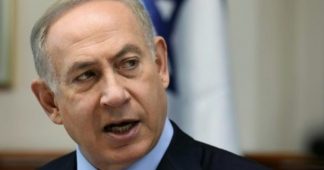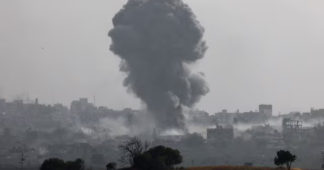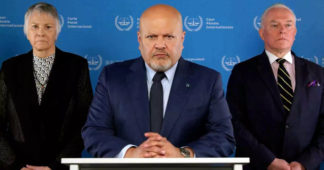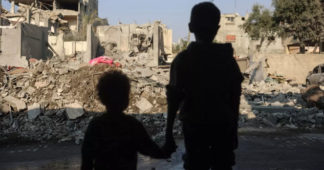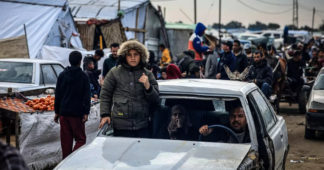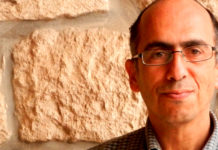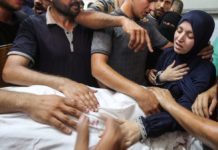While many Palestinians in Gaza see Netanyahu and Gallant warrants as merely symbolic, the faint promise of justice still resonates
By Maha Hussaini in Deir al-Balah, occupied Palestine
22 November 2024
Sitting in Gaza City, Anas al-Ramlawi could hear the bombardment of northern Gaza. He read the news. The International Criminal Court (ICC) had issued arrest warrants for Israeli Prime Minister Benjamin Netanyahu and former defence minister Yoav Gallant.
The 30-year old, from the Nasser neighbourhood in western Gaza City, has already lost his home to Israel’s relentless attacks. As he read about the historic legal step, a “glimmer of hope” arose within him.
“It was perhaps a coincidence that I was reading about the arrest warrants while I could hear the sound of a massive explosion caused by the Israeli army bombing and demolishing residential buildings in Jabalia, just a few kilometres from where I stay,” Ramlawi told Middle East Eye.
“When I heard the explosion and read the news of the arrest warrants, a glimmer of hope arose within me – the possibility of one day seeing those responsible for these crimes in the dock.”
This is the first time the Hague-based court has issued arrest warrants for senior officials allied with western powers, a step Palestinians in Gaza, which has been under Israeli blockade since 2007, view as a “breaking of isolation after over a year of genocide”.
“For over 13 months, we have endured various forms of pain, perhaps the most excruciating of which is the feeling that everyone has abandoned us, leaving us to face the Israeli occupation determined to annihilate us. Today, this brings some hope that we are not totally alone,” Ramlawi continued.
“Arresting them is still a distant dream, but at least it gives us the sense that the perpetrators of these heinous crimes that are committed against us are now being pursued and will eventually be forced to stop committing such atrocities. I hope we live to see the arrest warrants executed and justice served for us.”
The ICC’s pre-trial chamber found reasonable grounds to believe that Netanyahu and Gallant “each bear criminal responsibility for the following crimes as co-perpetrators for committing the acts jointly with others: the war crime of starvation as a method of warfare; and the crimes against humanity of murder, persecution, and other inhumane acts”.
According to the chamber, there are “reasonable grounds to believe that both individuals intentionally and knowingly deprived the civilian population in Gaza of objects indispensable to their survival, including food, water, medicine and medical supplies, as well as fuel and electricity”.
Symbolic warrants
Roaa Shawwa had just finished a task she carries out every day: trawling for hours through the shattered streets of Deir al-Balah to secure some morsel of food for her children.
She told MEE she sees the arrest warrants as more symbolic than actionable.
“I am aware that this is a very important and historic step. Theoretically, it is a huge step to bring justice to victims, but as a person trying to survive genocide day by day, I no longer believe that there is value for any legal or human rights measures,” she said.
“This is an important step for future generations, but as long as the governments of the world continue to support the Israeli militarily with weapons that are intended to exterminate us, and fail to impose serious sanctions on it, I won’t feel too optimistic about it.”
The ICC’s warrants are considered the second major legal step against Israel’s devastating war on the Gaza Strip, following the International Court of Justice (ICJ)’s ruling in January 2024, which mandated that Israel refrain from acts that could constitute genocide and ensure the protection of civilians.
On Thursday, Gaza’s health ministry said that 71 Palestinians in the Strip had been killed in Israeli attacks in the past 24 hours, bringing the total to 44,056 killed since the war began following the Hamas-led attacks of 7 October 2023.
Additionally, 104,268 people have been wounded since the start of the war, according to Gaza’s health ministry.
“No one can deny this step is still a small measure of justice for the victims, but will it bring back the tens of thousands of civilians who were killed? Will it make an entire generation forget what they have gone through? Will it bring back our homes?” Shawwa asked.
“I am not pessimistic, nor do I underestimate the importance of such legal steps. But I know that major powers like the United States will not allow actual arrests to take place, nor will they allow justice to be fully served for the victims, simply because they are Palestinians.”
Justice and memory
The US “fundamentally” rejected the ICC decision on Thursday. “The ICC issuance of arrest warrants against Israeli leaders is outrageous,” President Joe Biden said in a statement.
“The United States has been clear that the ICC does not have jurisdiction over this matter,” a US National Security Council spokesperson said.
Yasser Abu Wazna, a forcibly displaced Palestinian in the southern Gaza Strip, recounted the bombing of his brother’s family in Khan Younis, which took place on the same day last year.
“Although it might seem strange, I feel compelled to share this memory today, the day the International Criminal Court issued arrest warrants for Netanyahu and Gallant,” he wrote in a Facebook post.
“Everyone in the tent was fast asleep: Ibrahim, Hala, Ahmad, Mahmoud, and my wife, Dalia. I was the only one awake, tossing and turning, with the faint sound of news playing from my phone’s speaker.
“Suddenly, the silence was shattered by my phone ringing. Calls at that hour always brought dread, heralding bad news. I grabbed the phone quickly, desperate to silence it before it woke everyone.”
On the other end of the line was Abu Wazna’s brother, Fadi. He was speaking from under the rubble.
“[He said] ‘Yasser, it’s Fadi, your brother. They bombed us, Yasser. They bombed us. Come help me. I, my daughters, my wife… everyone’s under the rubble,” Abu Wazna recalled.
“The line then went dead. At that moment, it felt like the entire world collapsed. Fadi’s voice wasn’t just a cry for help; it was a wound etched into time, a memory seared into my mind that nothing can erase.”
Fadi survived. But his family – his three-year-old daughter Maria, his three-month-old daughter Jana and his wife Shorouk – had all been killed. “The weight of their absence remains an unknown wound in his heart,” Abu Wazna wrote, “and our hearts cannot be healed by words.”
We remind our readers that publication of articles on our site does not mean that we agree with what is written. Our policy is to publish anything which we consider of interest, so as to assist our readers in forming their opinions. Sometimes we even publish articles with which we totally disagree, since we believe it is important for our readers to be informed on as wide a spectrum of views as possible.
